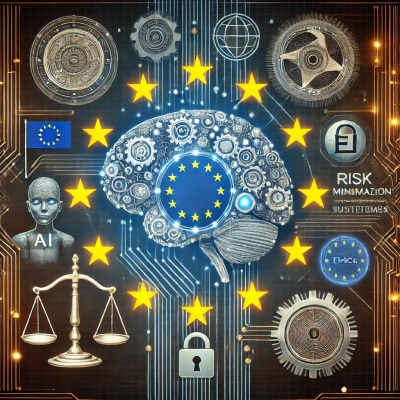5. The Influence of Europe on Digitalization
How Europe shapes digitalization with regulations to protect citizens, create a single digital market, and regulate tech giants’ power.

Europe is a key global player in shaping digitalization. While regulation on digitalization is minimal in many countries outside Europe, Europe enforces regulations to curb and control the rapid development in this area. The underlying goals of Europe are the protection of European citizens, the creation of a single digital market where all member states can share information and services, and the regulation of the power of several monopolists such as Google, Meta, Microsoft, and other mainly North American technology companies. These three pillars are essential to understanding the direction and intent of European legislative initiatives.
Protection of Citizens
The protection of personal information and data of European citizens is central to many EU legislations, such as the General Data Protection Regulation (GDPR). The GDPR was introduced in response to growing concerns about privacy, especially given the increase in digitalization and data-driven approaches by companies and governments. This regulation ensures that personal data is processed only with the necessary consent, provides citizens with extensive rights to control their data, and imposes strict penalties on those who violate these rules. This is a response to the increasing incidents of data breaches and the general concern about the safety of personal information.
Single Digital Market
The European Union aims to create a Digital Single Market that makes it easier for businesses to operate across borders and offers consumers more choice, better prices, and high-quality services. Legislations such as the eIDAS regulation and the recently proposed Digital Markets Act and Digital Services Act are designed to eliminate digital barriers between member states and create a level playing field. This includes addressing issues such as geo-blocking, unfair contract terms, and promoting the interoperability of digital services.
Regulation of Monopolists
Another important aspect of EU legislation is regulating the dominant position of large technology companies, mostly based in North America, such as Google, Meta, Apple, Microsoft, Facebook, and Amazon. Together, these companies provide more than two-thirds of the digital services in Europe. They thus have enormous influence on the European markets, often without appropriate local investments or tax contributions, leading to concerns about unfair competition and disruptive effects on local businesses. The Digital Markets Act, for example, focuses on controlling the market power of these giants by addressing practices that hinder competition and by increasing transparency and choice for users.
Future Challenges and Directions
Digitalization does not stand still. Therefore, new regulations are being worked on. The challenge is to find a balance between protecting the interests of citizens and stimulating technological and economic growth. The implementation of these rules must also take into account the rapidly changing technological landscape, with new developments such as artificial intelligence (AI) and blockchain raising new issues. Specifically, several new laws will come into effect in the coming years

Data Governance Act and Data Act
These future laws will further shape how data is shared and managed within the EU. For the Netherlands, this means encouraging the secure sharing of data between companies and governments, with a strong emphasis on privacy protection. Within this context, sector-specific legislation is being developed, such as the European Health Data Space (EHDS). The goal is to promote the secure and efficient exchange of health data, giving citizens more rights regarding their medical data while creating more space for research and innovation in healthcare.
In addition, specific regulations will be introduced for Cyber Resilience (improving the security of connected devices, software, and other digital products), ePrivacy (modernizing electronic communication), and Green Digital Framework (making the digital sector as a whole more sustainable).

Artificial Intelligence (AI) and Regulation
The EU is working on a regulatory framework for reliable AI, which is essential for minimizing risks and setting ethical standards. This will affect how Dutch companies and government agencies develop and implement AI technologies.

Strengthening Digital Infrastructure
Further investments in digital infrastructure such as broadband, 5G, and future 6G networks are expected. This will help the Netherlands become better connected and more competitive in the digital age.

Digital Skills
Initiatives to improve and expand the digital skills of the European population are crucial for inclusive participation in the digital society and economy. The Netherlands is expected to remain active in supporting these educational programs.
Conclusion
Europe’s role in the digitalization of the Netherlands is significant and lasting. Every organization will need to start implementing these rules again in the coming years. What is striking is that the Netherlands has achieved relatively little in terms of regulating digitalization. We now have the Archive Act and the Open Government Act, but there are also many laws and regulations that have never been finalized. For instance, the Digital Government Act is still under development, and there was talk of an Information Management Act, but that now seems to be off the table. The Netherlands is increasingly looking to Europe and is taking less control over the course of digital legislation itself. And this while the Netherlands is one of the most digitized countries in Europe.
The future requires a balance between encouraging innovation and protecting the rights and safety of citizens. The exact impact of future legislation will be highly dependent on the dynamic developments within the digital economy and the political will within the EU. All this requires an alert and adaptive approach from both policymakers and companies within the Netherlands. Meanwhile, the rest of the world is watching with interest to see what Europe will come up with.